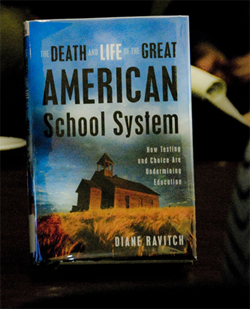Redefining Accountability
When the federal No Child Left Behind Act (NCLB) was passed in 2001, former Assistant U.S. Secretary of Education and TC faculty member Diane Ravitch--along with an overwhelming 90 percent of Congress--thought the legislation, which touted test-based accountability and the evaluation of teachers based on test scores of their students, would be a move in the right direction for education reform.
But, nine years later, Ravitch, now on the faculty at NYU and a fellow at the Brookings Institution, is no longer convinced that the strategies favored by NCLB--particularly the law's penalty-driven mandate to achieve universal student proficiency in math and English by 2014--are benefiting underperforming schools or education in general. This past spring, Ravitch spoke to an enthralled audience at a BookTalk event in Gottesman Libraries, outlining her thoughts on reform and the current state of education, which is the subject of her recently-released book, The Death and Life of the Great American School System: How Testing and Choice Are Undermining Education (Basic Books, 2010).
According to Ravitch, many problems with NCLB are rooted in a shift that occurred when the legislation was first enacted: legislators, along with educators, began viewing education through a business lens, as opposed to a curriculum lens. One result of that shift, Ravitch said, was that "with the No Child Left Behind Act, schools became data-driven, not mission-driven."
Evidence of this change is reflected in the resumes of those with critical decision-making power. "There are more education experts in state and local Departments of Education than at the national level," said Ravitch. "Congress distributes money well, but they don't have the knowledge or wisdom to reform."
In the case of NCLB, this lack of expertise has had tangible, devastating effects, with the increased emphasis on passing state-set standardized tests resulting in states "dumbing down" tests to reach national standards. In one extreme case,
It's students who face the consequences for these inflated scores, which Ravitch--who believes testing is best used as a diagnostic tool, rather than as a ranking tool--referred to as “Enron accounting." The demoralizing effects of this "take a human toll” when students who received B-level grades in New York City public high schools cannot pass basic placement tests at community colleges. "We're lying to the children," she said.
Yet if underperforming schools were to report minor or no gains, they would face closure, thanks to the harsh penalties in both NCLB and Race to the Top, the Obama Administration's version of education reform, which employs a similar--and in some cases more stringent--accountability policy.
To illustrate the faulty logic of such penalties, Ravitch imagined applying an NCLB-style approach to making cities crime-free. The result in cities that failed to meet deadlines--firing cops and closing police stations--would simply turn a bad situation into a disastrous one.
Another troubling aspect of NCLB has been of its approach to school choice. The law gives students the option to leave underperforming schools--which may or may not help the students, but unequivocally results in less funding for schools that typically are already operating under severe financial constraints. In
Since charter schools are adequately funded to support smaller classes and tend to attract the better-performing students, Ravitch calls comparisons between performances of students at public schools and charters "unfair." Increasing a de facto flow of dollars to charters at the expense of public schools, Ravitch said, NCLB has contributed to a state of "academic apartheid."
More broadly, Ravitch feels that charters, in general, are not the answer to faltering public school school systems. On average, charters don't register higher test scores than public schools. Studies that counter that finding--such as a Harvard effort that looked at charter schools in
Despite the discouraging implications of accountability and choice, as currently defined in NCLB, Ravitch does not think school improvement is a lost cause. "We need a stronger education profession--the future of public education is at stake, and it's time to change directions."
Ravitch's analysis, indeed, is pointing education in another direction: "Schools are part of the community, representing traditions, values and cultures," she said. "It's not like managing a stock portfolio--it's like managing a family."
Published Monday, Jul. 19, 2010


